|
Wincheap Street
Thannington
Canterbury
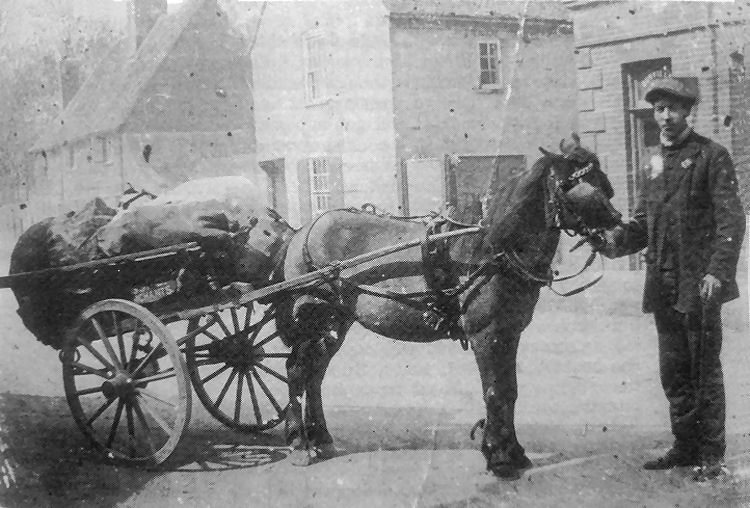
Above photo, circa 1890, kindly sent by Rory Kehoe. Showing "Moses"
Jackson, who was a scrap metal dealer and general merchant, whose
business and home was located at 18, Knott's Lane. Near to the "Lord
Nelson." The pub on the right
is advertising Dunville's VR Whiskey and Clive Bowley tells me
it's actually outside the "Hop Poles." |
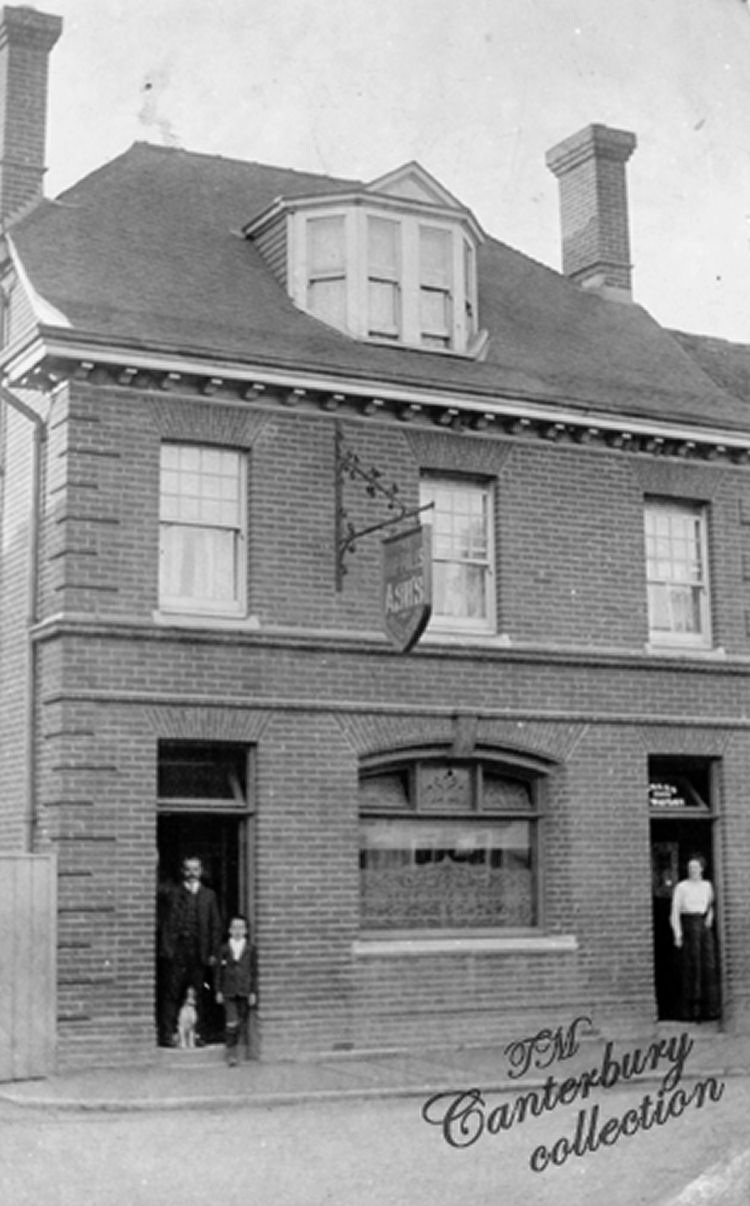
Above picture showing the "Hop Poles" in 1911. Taken from
http://www.machadoink.com
|
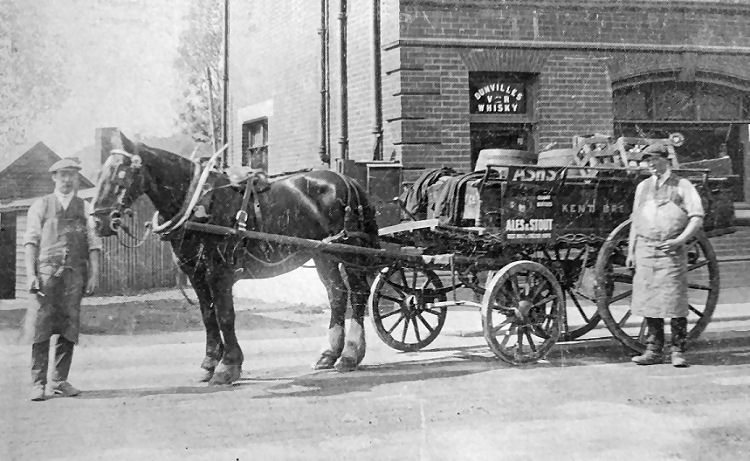
Above postcard, circa 1920, kindly sent by Rory Kehoe. The drayman on
the right is Bert Fagg. |
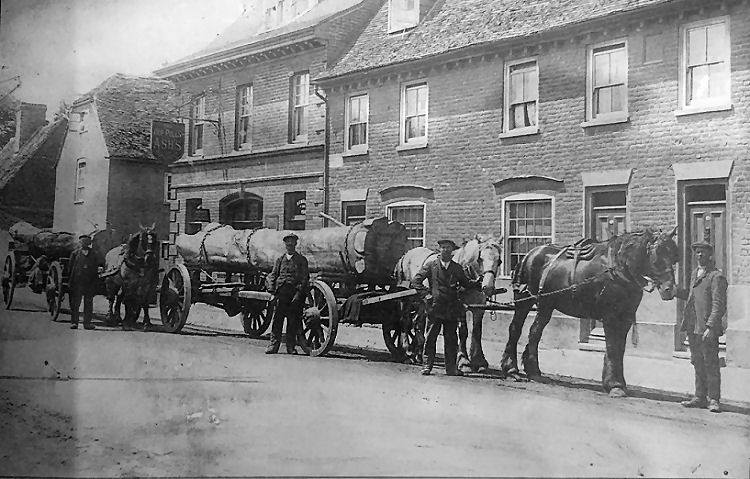
Above photo 1923, showing timber being hauled by Gipson Brothers, of
Shalmsford Street, Chartham. Sent by Rory Kehoe. |
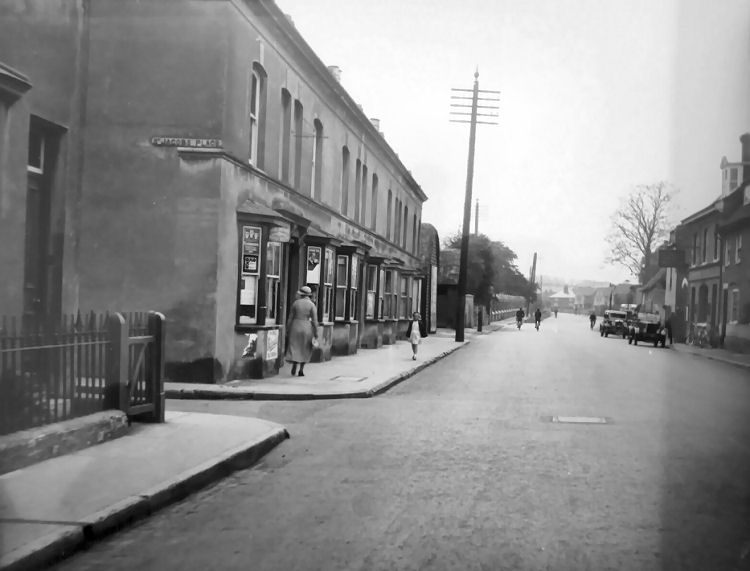
Above photo, circa 1936, kindly sent by Rory Kehoe. |
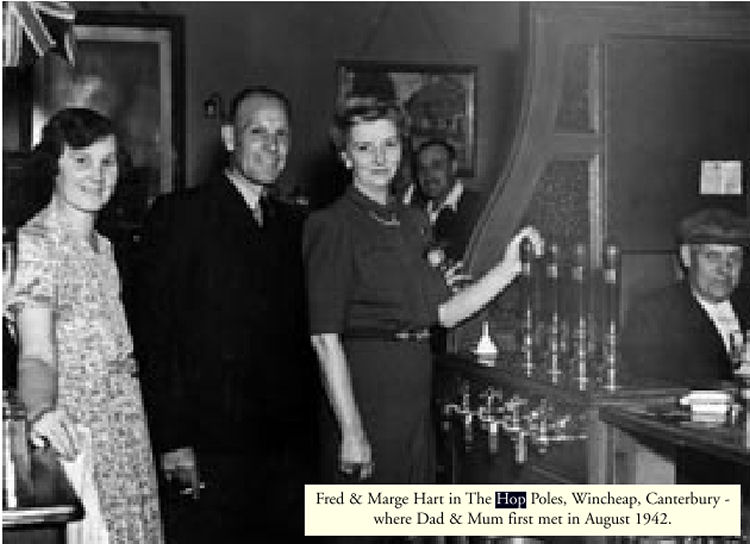
The above photo shows Fred and Marge Hart, inside the "Hop Poles"
circa 1942.
|
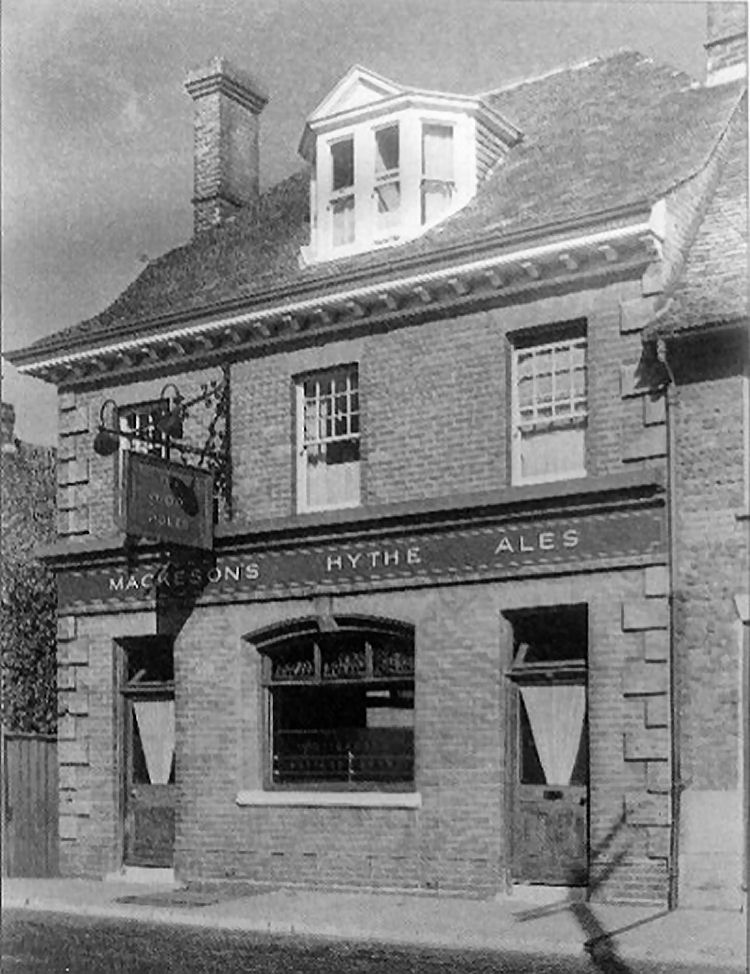
Above photo, circa 1949, kindly sent by Rory Kehoe. Pkoto taken just
before the single-storey extension was built c.1950. The building next
door (Thanington Dairy) was demolished to provide space for this
extension as well as a small car park. |
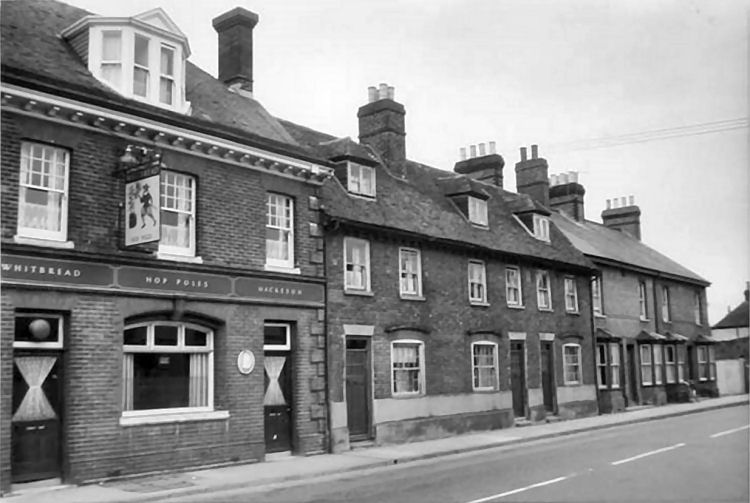
Above photo, 1961, kindly sent by Tim Timpson. |
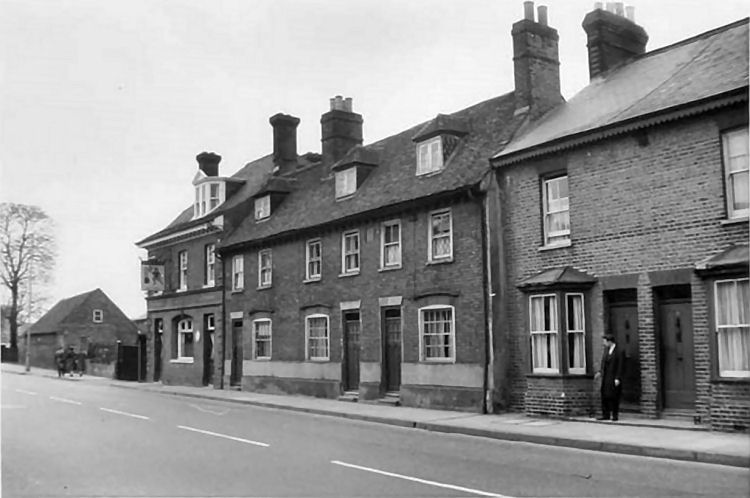
Above photo, 1961, kindly sent by Tim Timpson. |
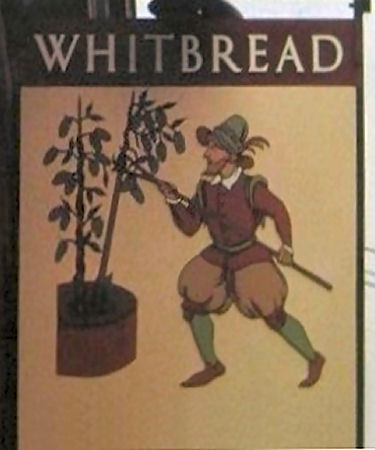 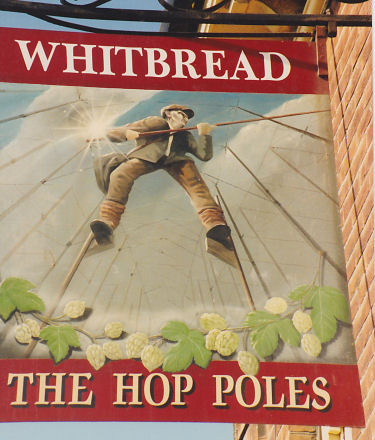
Hop Poles sign left 1968, sign right August 1991.
Above with thanks from Brian Curtis
www.innsignsociety.com |
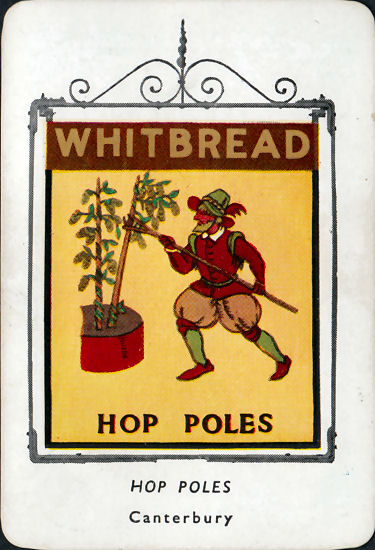 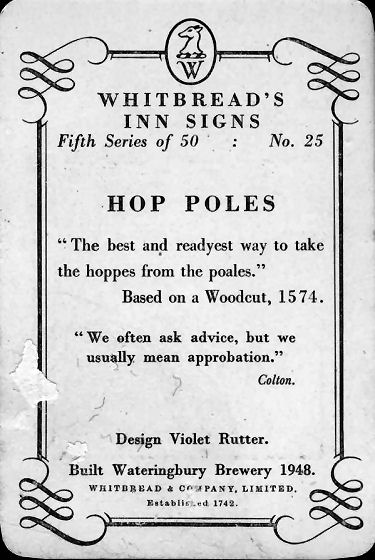
Above card issued April 1955. Sign series 5 number 25. |
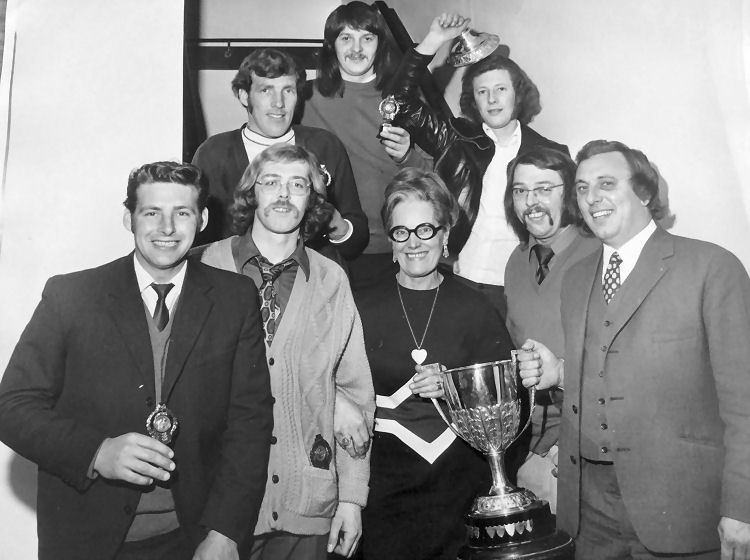
Above photo showing the billiards cup winners from the early 1970s.
Back Row L to R Mick Wells, Neil Hewitt, Colin Humphreys.
Front Row L to R George Harvey, Ro Mansfield, Min Sewell (Landlady),
Dave Mansfield, Vic Redpath. Kindly sent by David Mansfield. |
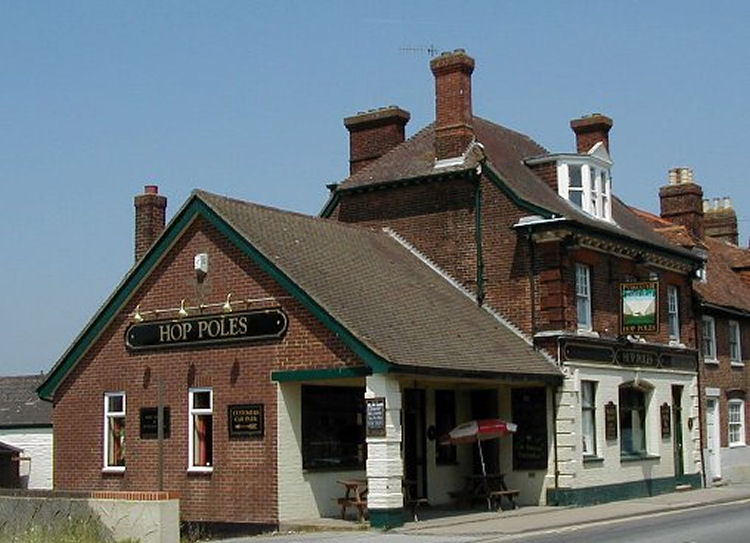
Above photo June 2001 taken from
http://canterburypubs.co.uk |
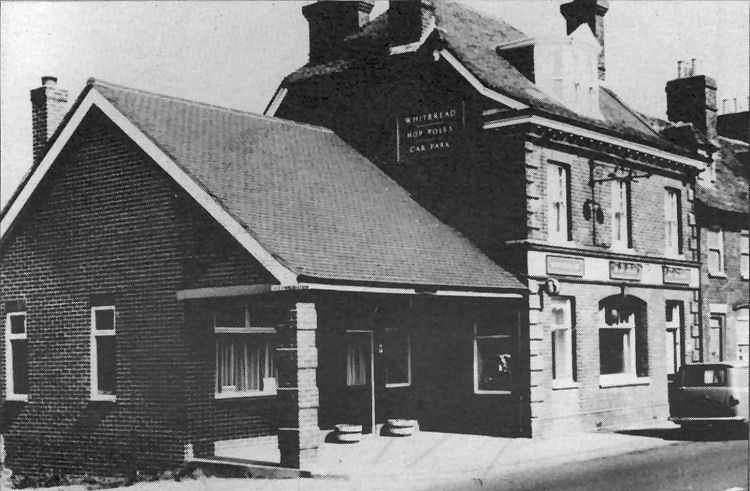
Above photo taken by Edward Wilmot in 1965. |
The Parish of Thanington is near the City of Canterbury, in the County of
Kent, England.
Situated at the farther end of Canterbury on Wincheap, the pub
unfortunately closed at the end of 2006 and is now operating as a Cafe
called Solo.
I believe the pub was originally called the "Three Hop Poles"
and changed name some time between 1828 and 1832.
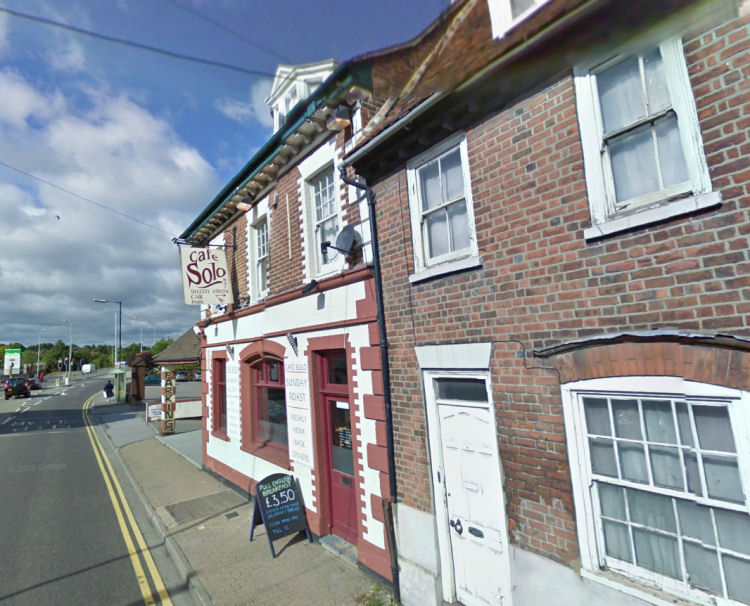
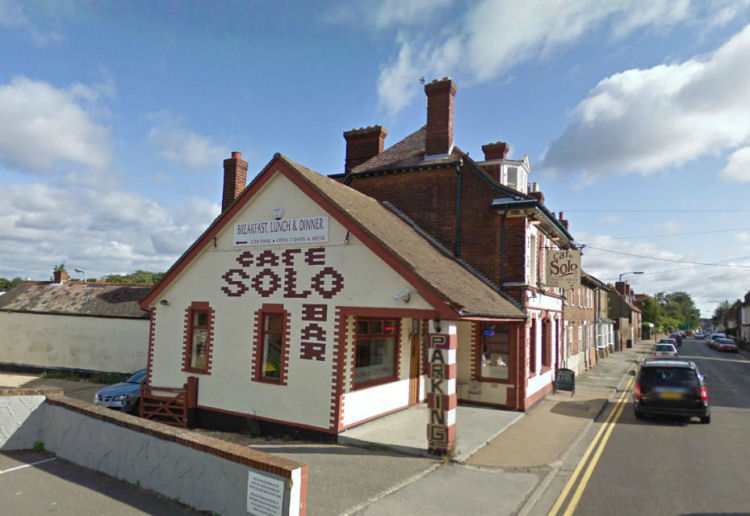
Above pictures taken from Google maps September 2009. |
Mentioned in Bagshaws directory of 1847 but may be older as in the 17th
century there was a dwelling house on this site which may have had
permission to draw ale.
Further research mentions a pub called the "Hop Poles" in 1768 addressed
as in the Parish of Wincheap, which suggests the same, although probably not
the same building. See below.
|
From the Kentish Gazette or Canterbury Chronicle,
Wednesday, 7 September to Saturday, 10 September, 1768. Price 2d.
TO BE SOLD BY AUCTION
On Thursday the 22nd of September, Instant. At the “Sign of the Hop
Poles,” in the Parish of Thanington (near the City of Canterbury) in the
County of Kent, between the Hours of 3 and 5 in the Afternoon.
One full equal undivided Moiety, or Half-Part of all in that Freehold
Messuage or Tenement, with Two substantial Oasts, Garden, and other
Premises, thereunto belonging, situate in the Parish of Thanington, in a
certain street called Wincheap, and now in the Occupation of John
Blaxland or his assigns.
Also, One full equal undivided Moiety of Half Part of and in all those
Two Freehold Messuages or Tenements, with the Gardens, Oasthouses, and
Buildings there unto belonging, situate in the Parish of Chilham, in the
said County of Kent, and now in the several Occupations of William Wills
and ------- Wills, or their assigns. Which said Premises are chargeable
with an Annuity of four Pounds during the Life of a Person who is upward
of Forty Years of age.
For further Particulars enquire of Mr. Slodden, Attorney at Law at
Canterbury.
|
|
From the Kentish Weekly Post or Canterbury Journal 7
September 1819.
VALUABLE BREWERY,
Free Public Houses and other estates,
To be Sold By Auction, By Messrs. White, (Without Reserve).
Pursuant to certain orders of the Vice Chancellor of Great Britain, and
before the Major part of the Commissioners named and authorised in and
by a Commission of bankrupt awarded and issued against Matthew William
Sankey, of the City of Canterbury, brewer, dealer and chapman, at the
Guildhall, of the said city of Canterbury, on Wednesday next, the 22nd
day of September next, at eleven o'clock in the forenoon, (subject to
such conditions of sale as shall be then and there produced.)
The following very Valuable Freehold Estates, in Lots.
Valuable Brewery free public houses and other Estates to be sold by
auction by Mrs white without reserve.
Lot 10. A Messuage called the "Hop Poles," with a stable, yard,
garden and the appurtenances, situate in or near Wincheap Street, in
Thanington, in the said County, and now in the occupation of George
Stubberfield. |
|
Kentish Gazette, 29 June, 1821.
FREEHOLD PUBLIC HOUSE,
NEAR WINCHEAP, in THANINGTON.
TO BE SOLD BY AUCTION, By Mr. THOMAS MINTER,
AT the "Hop-Poles," near Wincheap, in Thanington. in the County of
Kent, on MONDAY, the-16th day of July, 1821, at 12 o'clock at noon,
(subject to such conditions of Sale as shall be then and there
produced).
All that MESSUAGE, called the "Hop-Poles," with the new-built
Stable, Yard, Garden, and Appurtenances, situate in or near Wincheap
aforesaid, and now in the occupation of George Stubberfield.
The Land Tax is Redeemed.
The Tenant trill shew the Premises; and for further particulars
apply (if by letter post-paid) to Mr. Shepherd, Solicitor,
Faversham.
|
|
From the Kentish Gazette, 19 April 1842.
ASHFORD, CANTERBURY, and FOLKESTONE, in KENT To brewers, Innkeepers, and Capitalists.
TO BE SOLD BY AUCTION, By Messrs. BAYLEY and REEVE,
ON WEDNESDAY, the 4th of May, 1842, at Two o’clock, at the "Royal Oak
Inn," Ashford (by the direction of the Proprietor, who is leaving the
county).
Lot 2:— All that FREEHOLD PUBLIC HOUSE, called the "Hop Poles," with the
stabling, yard, and garden, situate in Wincheap-street, in the Parish of
Thannigton, in the City of CANTERBURY, in the occupation of Mr. James
Hodges.
The Purchaser of this Lot may have immediate possession.
Printed Particulars and Conditions may be had ten days preceding the
sale, of Messrs. Robert and George Furley, Solicitors, and of the
Auctioneers, Ashford.
|
|
Kent Herald, 16 October 1845.
Marriages.
Oct. 14, at Thannnington church, near this city, Mr. Daniel Gann, landlord of
the "Hop Poles" public house, Wincheap, to Miss Eliza Connolly.
|
|
Kent Herald, 23 October 1845.
Henry Back, alias Anderson, 21, William Back, 37, and Edward Back, 35, charged
with having, on the 29th August, stolen a sack and a bushel of brain and peas,
the property of Richard Ford, of Chilham. The bran and peas had been given to
Robert Rolfe, a wagoner to prosecutor, previously going out with the team, which
was baited at the "Hop Poles," in the parish of Thannington, at which the
prisoners were staying with their horse and cart. Shortly after their departure,
the wagoners found his horses' meat gone; he, in consequence, pursued the
prisoners, and found the mixture in their cart, from which a portion of the sack
were given up by the prisoners; but in the course of the contest that arose one
of them knocked him down.
Mr. Horne, for the defence, attempted to show that it would be hard to include,
with William, the other two, who did not appear to have participated in the
offence, for one of them even said to him that it would be better to give up the
corn if he had it, while the other only knocked down the Wagoner in the dispute
that took place.
The Chairman summed up very distinctly, and pointed out the act of one being
that of all, for it did not appear that either had adopted particularly means
for restoring the property to the wagoner; and, more than that, one of them had
shown that if he had not a hand, he had at least a fist in the matter for he
knocked the wagoner down when he was only requiring what was his own.
A verdict of guilty was returned against the prisoners Henry and William, but
not guilty as respecting the prisoner Edward. William Back had before being
convicted of felony. The chairman said the court had means of knowing that the
prisoners had been leading a most abandoned life, and form part of a desperate
gang. He could assure them, if they were ever again convicted of felony, they
would be transported. He sentenced Henry to three and Williams to six months
imprisonment in the house of correction, the first and last seven days of each
to be solitary.
|
|
Kentish Gazette, 8 June 1852.
Accident.
A man, named John Belsey, met with an accident on Tuesday evening, at
Wincheap fair. He had been drinking at the "Hop Poles" public house,
when, coming down the fair, he went into the "King's Head," and in
trying to force his way into a room where dancing was, got pushed down,
by which one of his legs were fractured. He was at once taken to the
hospital.
|
|
Kentish Gazette, 17 January 1854.
Running Down case. Rose v. Clark. Jury case.
This was an action to recover the sum of £18 for injury done to the
horse and cart belonging to the plaintiff through the
furious driving of the defendant. Mr. Mercer for the plaintiff and Mr.
Ribton (council) for the defendant.
Our readers will remember that at the previous Court an action was
brought by George Newton against the same defendant
for injuries received by him at the time of this accident, when a
verdict was given for the plaintiff with £50 damages. A great
number of witnesses were then called, and to-day they repeated the
evidence then given, with very little variation, one or two
additional witnesses being produced, who identified the defendant
(Clark) as the man who drove the cert on the night of the
accident.
Mr. Mercer having opened the case and detailed the particulars, as they
would be proved in evidence, then proceeded to call
the fallowing witnesses:—
The plaintiff deposed that be heard on the Saturday of the accident
having taken place, and he went and looked at the mare;
he found her in a very bad state, and she was in consequence laid up for
four or five weeks.
On Sunday he went to the defendants, and told him he had heard, that he
had run against his mare.
The defendant replied:— What time did the accident take piece?
Plaintiff said he knew best.
Defendant answered — you be ------.
Chas. Valence was going to Canterbury, on the 3rd of September, in a
light cart, and when he had reached White-hill, he
heard a cart coming along at a fast rate; it ran against the cart he was
in, and threw George Newton, and himself out—the
horse ran away.
He hollowed out "What are you after?"
There was no answer; and the parties drove off.
George Newton deposed that he was a painter. On the 3rd Sept. last, he
was requested by Mr. Valence to accompany him to
Canterbury. They left Mr. Rose's yard just about eight o'clock in the
evening. Just beyond Chilham station, at Whitehill, they
heard a horse and cart coming along very fast. He said to Valence, "pull
up as close as you can." Valence pulled up to a
Stand still as close to the hedge as he could get, and they both halloed
as loud as they could. They saw a horse coming along
at a rate of about 12 miles an hour. The cart ran against the nave of
their wheel, and turned the cart completely round. The
driver (Valence) was thrown out, and he (witness) was thrown between the
cart and the horse. The shafts were both broken,
and the cart overturned on to his leg, which it broke, also fracturing
his ankle. He had been a cripple ever since, and under
medical treatment.
James Buss proved the time the accident took place; it I was about a
quarter or 20 minutes past 9 o'clock on the night of the
3rd of September.
Stephen Butcher, (keeper of the Wincheap turnpike gate) stated that the
defendant, with Mr. Horton, passed through his
gate at three minutes before 9 on the night of the accident, in his
horse and cart: he had not then put up his light, as it was
not dark enough. Was driving at the rate of 12 miles an hour.
George Loram deposed that he remembered the 3rd of September last. On
that day he went with others, from Chartham to
Canterbury; he left the former place for that purpose about half-past
eight in the evening and met a horse and cart about a
mile this side of the toll-gate. He believed Mr. Clark was driving.
Croat-examined by Mr. Ribton:— It was about four miles from where we saw
Clark to where the accident took place; saw
Clark about ten minutes past 9.— Went into the "Hop Poles" with Link;
did not see him take out his watch; did not sit nor
stand near the window.— Would not swear, Clark was in the cart, but
believed he was. Mr. Pain did not tell me what I was to
say to day, nor have I received any money from him.
A labourer of the name of Link gave similar testimony.
Henry Cook, an engineer at Mr. Wetherley's Mills at Chartham,
remembered the 3rrd of September last, on which occasion he
went lo the Chilham station, to meet a friend coming from Maidstone; the
train was due then at 18 minutes past 9. His friend
did not come, and he returned home; as he was going along he saw Nutting.
When near Whitehall, a quarter of a mile from
the station, he met two men in a horse and cart; they were driving very
fast when they passed him. Mr. Clark was driving; he
had known Mr. Clark some time. He looked at him for a minute or to, as
he thought he was driving very fast. He then went
homewards, and found a young man lying in the hedge with his leg broken;
the cart was by his side. He should say it was 80
or 90 yards from the spot where the cart passed him.
J Hopkins Payne deposed that he lived at Canterbury. On the 3rd Sept.,
he had been to Shottingden, which place he left (for
Chilham) about a quarter to nine. Before he got to the station the train
passed, and he proceeded on the road to walk to
Canterbury. Just before he got to Chilham, he met a small pony and cart;
the pony was driven very slowly by a young man.
There were two young women in the cart. He afterwards saw a horse and
cart, which was a being driven at a very fast pace.
The driver was Mr. Clark, of Shottingden, Chilham. He was beating the
horse. Directly after Clark had passed him, he saw a
confusion in the road, and several persons running. He consequently ran
to the spot, and he saw Newton lying in the road.
Cook and Nutting were with him. He was confident that no other vehicle
had passed after Clarke passed, until he got up to
the place where the plaintiff was lying. He reached that spot about
three minutes after Clark passed.
[This witness was subject to a severe cross-examination as to his
previous conduct and dealings, but he distinctly negatived
the insinuations of the learned counsel, whose questions did not appear
to have the remotest bearing on the case at issue,
although they might possibly have been of some importance, had Payne
been the plaintiff instead of a witness.]
John Nutting, a waggoner, went to Canterbury on the night in
question—and returned at a little before four o'clock, when he
passed Mr. Clark in his cart in Wincheap, driving fast. Afterwards, he
went to the Chilham Railway Station, and on returning
passed a horse and cart, which he took to be the same he had seen
previously, in Wincheap. There ware two persons in the
cart; would not swear who drove. About 100 rods further on, he saw a man
lying on the ground with his leg broken, and the
cart in the road.
Edgar Manser stated that the plaintiff's cart was brought to him to be
repaired, but it was too much damaged to allow of its
being repaired; it would have cost £5 to have placed it in a proper
condition; the cart might have been worth £10 before the
accident.
— Pope, a veterinary surgeon, of Ashford, stated the injuries received
by the plaintiff's mare: it was very much hurt; his bill
for attendance was £3.
Mr. Ribton then addressed the jury for the defendant:— If they were
satisfied that the defendant was the man who drove
the cart causing the accident, it would not only prove him to have
perjured himself both on the past and present occasion,
but that he had shown himself to be a very inhuman and unfeeling person.
But the answer he would give to the case that
had been made out for the plaintiff, would put a very different
complexion upon the whole affair,— and upon the evidence he
was about to call, he had no hesitation in expecting a verdict at their
hands. He then reviewed the evidence for the plaintiff,
remarking upon its bearing upon the case, and commented with some
severity upon the character of the witnesses adduced.
He did not impute perjury against the persons who had given evidence,—
but what he urged was, that they were mistaken in
fixing upon the defendant as the party who drove the cart occasioning
the accident.
He then called the defendant, who deposed, that he resided at
Shottingden, in the parish of Chilham. On the 3rd of
September last he went with Mr. Horton, to Canterbury, and put up at the
"Queen's Head;" he left at half-past seven at
night, having gone from the smoking room to the yard at 20 minutes past
seven. It took about ten minutes or a quarter of an
hour to get to the Wincheap-turnpike-gate; he passed Mr. Videon about a
quarter of a mile from the scene of the alleged
accident; it would have taken him about three-quarters of an hour after
leaving Canterbury before he could have reached the
spot where he passed Mr. Videon. In Stone Stile Lane, he met Amy Knowles
and Benstead. When he reached home it was
half-past eight, having left Mr. Horton at his own house, a short
distance from witness’s. After having partaken of supper, he
went to the "Woodman’s Arms," and met Mr. Horton there, according to
appointment; it was then a quarter or 20 minutes
after nine o'clock. From the time he left Canterbury till he reached his
home he did not come in contact with any cart, nor had
his own cart been damaged; it was impossible that he could have caused
such an accident without knowing it.
Cross-examined by Mr. Mercer:- He had but one light cart that he
generally drove; this is the first accident he had been
charged with. He had been to America, but had returned upwards of 20
years.
By His Honour:- From the Chilham Station it would take him 20 minutes to
drive to his own house; it was a distance of 2 miles.
Re-examined:- The cart he had with him to-day was the same he used on
the night the accident occurred. It took him an
hour to drive home from Canterbury.
Thomas Horton, accompanied the defendant to Canterbury on the day in
question; he confirmed his evidence. It was about
half-past seven when they left at night to return home. Mr. Videon left
the "Queen's Head" just before witness and the
defendant. It look about 5 minutes to reach the Wincheap-gate. Met
Benstead and a young woman in Stone Stile Lane, and
spoke to the former. The cart in which he was riding did not come in
contact with any other during the journey.
Geo. Bond, hostler at the "Queen's Head," Canterbury, stated that the
defendant and Mr. Horton left about half-past 7 o'clock
in the evening.
Cross-examined:- The cart was not ordered any time at all. Mr. Videon
left about a quarter or twenty minutes before the
defendant. Did not start the defendant but saw him go. Did not swear on
the last occasion that there were more than 40
horses in the yard on the 3rd of Sept.; there were more than 4, but not
to many as 40: could not say how much money he
took then, he did not keep any account.
James Kennett, hostler, put Mr. Clark's horse to on the night in
question; he drove off about half-past 7. Knew it was that
time, because he had heard the clock strike 7.
Crova-examined:- Knew the clock struck 7 because he counted the strikes;
could not always count them because he was
sometimes asleep.
[Mr. Mercer:- Are you wide awake now then? (Laughter.) Witness smiled
assent.]
Could not say who left the yard at either 8, 9, or 10 o'clock the same
night.— Did not know how many horses there were in
the yard that day—it was not his business.
James Videon, a farmer, living at Moldash, was at the "Queen’s Head,"
Canterbury, on the 3rd Sept.—Saw Mr. Clark there;
he left about a quarter past seven. Was no relation to the defendant,
and had no interest in the result of this action. Mr. Clark
overtook him about four miles from the Wincheap gate, and 60 or 70 rods
from where it was represented the accident took
place. He reached home about half past eight; knew that was the time
because he asked his servant what time it was, and
she said just half-past eight.
Cross-examined:- The cart that passed him was trotting; he was going at
a good pace.
Charles Videon, jun., gave similar testimony.
Cross examined:- It was 10 minutes or a quarter past 9 when they left
Canterbury—but was not sure which.
John Benstead, a blacksmith, of Shottingden, took up Amy Knowles at her
own house, on the 3rd Sept., and drove down
Stone Stile Lane; he there passed Mr. Clark with Mr. Horton t it was
about a quarter past eight, he reached Chilham station
before the train arrived.
Cross-examined.— Both going and returning he went along Stone Stile
Lane; did not meet any one on foot as he returned.
Amy Knowles, of Chilham, confirmed the last witness's statement— Just
before the last trial, Pain came to her house, and said
to witness— "You told me before that Clark passed you as you were coming
from the station." Witness replied that she did
not; what she said was, that Mr. Clark passed them as they were going to
the station."
Cross-examined.— Witness had wrongfully stated on the previous trial
that she was in the employ of Mr. Clark.
Wm. Jull, servant to the defendant spoke to his master coming home on
the night of the accident at half past eight o'clock.
Frederick Jenkins, a farmer, of Baldesmere, saw Mr. Hortan at the
"Woodman's Arms" on the evening of the 3rd of Sept.
Witness asked him what o'clock it was by Canterbury time; he replied, a
quarter to nine. Mr. Clark came in about 10 minutes
after that.
Sophia Finn, mother of the landlord of the "Woodman's Arms"; saw Mr.
Horton there about a quarter to nine, on the 3rd of
September last.
Elisabeth Finn, landlady of the "Woodman's Arms," heard Mr. Horton say
it was 10 minutes to nine, when he was at their
house on the 3rd of September.
Elijah Bartlett, carpenter:- On the 3rd of September he went to Chilham
Lees, with the witness Pain; did not return at night by
Stone Stile Lane, although they went that way. Did not know what road
they returned by—but they passed through Chilham
Square. Did not pass any cart. When they got to the place where the
accident took place, Pain asked witness if he
remembered seeing a cart pass them; he said no. Did not hear any one
mention Clark's name that night. People in the crowd
asked who could have done it; Pain must have heard them, but did not say
anything. When near Canterbury witness met his
brother, and told him of the accident; he asked who had done it; Pain
said they did not know, but hoped to find out before
long.
Cross-examined.— Had never been to Chilham before that day; it was a
very dark night, and inclined to rain. Did not notice
Chilham Castle; could not say that he passed through the turnpike gate.
Before reaching the place where the accident
occurred, did not see a horse and cart driving furiously. Could not say
for certain that he ran before reaching that spot.
Between the "Woodman’s Arms" and the
accident he did not meet a carriage
or any other vehicle.
Enoch Bartlett, met his brother and Pain on the night of the accident.
The latter said he did not know who had caused the
accident.
Wm. Warman, Wm. Skinner, and George Curtis, of Canterbury, and J. Dunn,
of Faversham, were then examined, with the
view of throwing discredit upon the evidence of John Hopkins Pain, who
was produced on the other side; they would not
believe him on his oath, they severally stated; but their reason for so
doing was based, as Skinner admitted, on the fact that
the witness had made promises to pay money, verbally and by letter, and
had failed to fulfil them—which drew forth strong
dissentient expressions from the persons assembled in the court-room.
Mr. Mercer then replied at some length, and with considerable power,
going carefully through the whole evidence on both
sides, and pointing out that the statements made by the plaintiff's
witnesses had not been impugned in one material
particular.
His Honour summed up, and the jury returned a verdict for the plaintiff.
|
|
Dover Telegraph and Cinque Ports General Advertiser, Saturday 23 May 1863.
Determine Suicide by Strangling.
At the Canterbury Police Court, on Thursday, a man named Gardner,
who resided in Westgate Grove, Canterbury, was charged with
disorderly conduct, on the previous evening, while in a state of
delirium tremens through drink. Gardner was discharged on promising
to abstain from intoxicating liquor for a month.
On Friday evening he left his residence, and on Saturday morning his
dead body was found at Cockering Bottom, in the parish of
Thannington.
On Saturday an inquest was held on the body, before Mr. W. P.
Callaway, deputy coroner, at the house of Mr. John Rolfe, the "Hop
Poles" public house.
William Sutton Buttress, labourer deposed:- About twenty minutes to
six o'clock last night I met the deceased by the allotment gardens,
on the footpath leading to Chartham. He was going towards Chartham.
I noticed nothing particular about him. I saw him about three
quarters of a mile from the place where the body was found.
William Bishop, of Lunns Field Cottages, labourer, deposed:- This
morning, about a quarter before 6 o'clock, I was going to work, and
as I was passing Cockering Bottom I saw the deceased lying on his
face quite dead, his feet being on the bank and his head on the hard
road. His left arm was across his chest and his right arm over a
stick which was in a loop made by a handkerchief placed around his
neck. The handkerchief was twisted very tightly under the chin, and
a deceased's face was covered in blood. I could see no wounds on his
face. The blood in my opinion, came from his mouth and nose.
Elizabeth Gardner, deposed:- The deceased was my husband, and was 44
years of age. He had resided in Westgate Grove for about 6-weeks and
was of no occupation. I last saw him alive about 5 o'clock yesterday
morning. In my opinion he had been out of his mind all day, but he
was much quieter than on several previous days. He had been drinking
freely for the last five or six weeks, and within the last 3 days he
had been quite violent. I have never heard him threaten to destroy
himself, but the fact of his having nothing to do worried him. I am
not aware of his having been in trouble lately on account of his
actions through intoxication. He suffered from delirium tremens on
December or January last.
The deputy coroner summed up and the jury returned a verdict that
the deceased strangled himself while in an unsound state of mind.
|
|
From the Kentish Chronicle, 23 May, 1863.
DETERMINED SUICIDE.
A person of gentlemanly exterior and address, who gave the name of Henry
Gardner, and said he was of no occupation, was brought before the
Canterbury justices, last week, under the following circumstances.
Supt. Davis said that the preceding night P.O. Lincoln found defendant
walking about the streets in Westgate, with only his shirt and trousers
on, and covered in blood. He had broken through the window of the house
where he is living, in Westgate-grove, and refused to go back, us he
said they wanted to lynch him. He was brought to the station-house and
his wife was communicated with, but she thought that was the best place
for him, as there was no telling what he might do in his then state of
mind.
When brought before the Magistrates, be promised to abstain from drink
for the future, and was discharged.
On the following evening he terminated his existence, and a more
determined case of self-destruction has not occurred in this
neighbourhood for some time past. It appears that he left his residence
about five o'clock on Friday afternoon, and at about half-past six he
was seen near Cockering farm, in the area of Thanington, by a man named
Sutton, going in the direction of the place where his dead body was
afterwards discovered. Nothing more was seen of him until between five
and six o'clock on Saturday morning, when William Bishop in the employ
of Mr Robert Lake, of Milton Chapel, discovered his lifeless body in
Cockering bottom, a short distance from Cockering farm. The head and
upper part of the body were lying in the road, and the feet in a small
copse of larch trees, elevated some 2ft. above the road. He was on his
face, his hands still clutching the walking stick with which he had
effected his destruction. Bishop hastened to his master's, and Mr. Lake
sent immediately for the county police. Superintendent Walker hastened
to the spot, under the impression that another murder had been
committed. He was soon satisfied, however, that it was a case of
self-destruction. The deceased appears to have taken every precaution to
ensure his deadly purpose proving successful. His neck-tie and hat were
taken off, and placed on a hop-pole stack. He then seems to have placed
himself between the trees, which are very close together, leaning his
back against one, the deep marks of his heels being visible when the
spot was examined. Here, in all probability, he tied his
pocket-handkerchief round his neck, and then, placing his thick
walking-stick through the loop of it, twisted it round, till
insensibility ensued, and he fell forward on his face in the road, as
above described, with the stick still firmly clutched in his hands. An
inquest was subsequently held on the body, before William Callaway,
Esq., the deputy coroner, at the “Hop Poles” public house, when the jury
returned a verdict of “Temporary insanity.”
|
|
Whitstable Times and Herne Bay Herald, 26 March 1870.
A TRIFLING OFFENCE.
At the St. Augustine’s Petty Sessions, on Saturday last, Mary Ann Rolfe,
keeper of the "Hop Poles" public-house, Wincheap, pleaded guilty to
keeping her house open for the sale of beer during prohibited hours on
Sunday.
Defendant urged that some beer was ordered on Saturday night to refresh
some persons who were coming to the house of a customer on the following
day, to attend a funeral. The liquor was put into a bottle on Saturday,
but not fetched until the following morning when the person who called
for it paid the charge.
Fined 6d., costs 8s.
|
|
Whitstable Times and Herne Bay Herald, Saturday 30 October 1875.
Fatal accident at Thannington.
On Friday last, Mr. Coroner Delasaux held an inquest at the "Hop Poles
Inn," Thannington, on the body of Thomas Newington, a child 18 months
old.
On the previous afternoon, Mrs. Huxley, wife of a labourer, found the
deceased head downwards in a washing "shawl," with a foot deep of water
in it, quite dead. The child have been previously seen playing about the
water in the "shawl", but there was nothing to show how he got into it.
The jury, however, assumed that he had fallen in, and returned a verdict
of "Accidentally drowned."
|
|
z'From the Whitstable Times and Herne Bay Herald. 13 January 1900. Price 1d.
THEFT OF MONEY.
Grace Elizabeth Perry, a young woman was charged with stealing £1 10s.
the monies of Rose Jones on the 9th January. Prosecutrix deposed that she lived at Ada Road, Wincheap. Prisoner was a
lodger with prosecutor for two or three days. Prisoner came at about
eleven o'clock on Saturday night. Witness agreed to lodge her when she
met prisoner at the “Hop Poles” at about six o'clock. Prisoner was to
pay 9s. a week. In prosecutrix' own room she had £8 in gold in a drawer.
She saw the money safe on Saturday morning between ten and eleven
o'clock. At 5.30 the previous day prosecutrix went to the drawer again
and counted the money and found that £1 10s. was missing. Prisoner stayed
with prosecutrix on Sunday and Monday night. From 10.30 till 12.30 on
Monday morning prisoner was alone in the house. Prosecutrix' father kept
the “Hop Poles.” That was why she was there. The drawer where the money
was kept was not locked. P.C. Ives stated that about 11 o'clock the previous night, from
information he received, he went to the “Hop Poles,” Wincheap Street.
Prisoner was there sitting in the back parlour dressed in clothes
produced. Witness said “Is your name Grace Perry” and prisoner answered
in the affirmative. Witness then charged her with stealing the money.
She said “I did not take it, I have not been near Mrs. Jones' room since
I changed these things this morning. My young man, a soldier, bought
these things for me, the costume at Mr. Hatton's for 17s. 11d., the hat
and tie for 3s. 11¾d., the gaiters from a shop in Burgate Street for 3s.
8d, the boots for 5s. 11d. from a shop in Castle Street. Oh! my God,
help me. I will do away with myself I did take the money, I was hard
up.” Witness took prisoner into custody. Prisoner pleaded guilty.
The Magistrates sentenced prisoner to fourteen days' imprisonment and
administered prosecutrix for not taking greater care of her money by
keeping it locked up. |
|
From the Whitstable Times and Herne Bay Herald. 2 March 1901. Price 1d.
DRUNK AND DISORDERLY.
James Sargent was charged with being drunk and disorderly in Wincheap on
the previous evening. P.C. Lockey stated that he saw the prisoner being ejected from the “Hop
Poles” public house on the previous evening at about 9.30. He was drunk
and would not go away. He was very abusive on the way to the police
station and he kicked witness on the leg. He had to get the assistance
of Sergt. Jackson and other police officers before he got the prisoner
to the police station. When asked in Court what he had to say the prisoner said “Will the
magistrates allow me time to pay it in.” The Magistrates' Clerk— You have not been fined yet. The prisoner— Oh! I beg your pardon I thought I had. The bench imposed a fine of 10s. and 6s. 6d. costs, or in default seven
days'. |
The pub has also been referred to as the "Three Hop Poles" in an 1832
directory, but this may have been in error.
The original building was under the reign of the Ash brewery when it was
rebuilt in 1904. All Ash's houses became Ash's East Kent brewery pubs in
1920, then in 1923 Jude, Hanbury took over. In 1929 they in turn were
acquired by Whitbread's.
According to research while open the pub had a beer garden which doubled
as a car park and the housed a parrot in the bar.
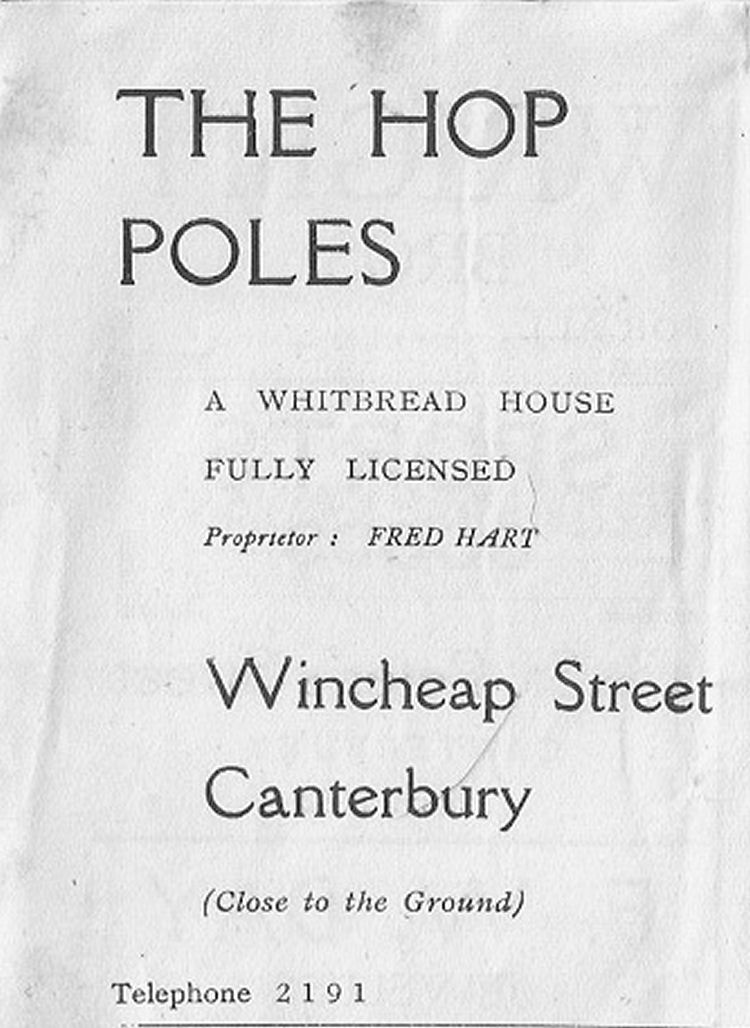
Above advert from a Canterbury City FC vs. Royal Marines FC football
programme for Saturday 25th March 1950. Kindly sent by Rory Kehoe.
The "Hop Poles" being located "close to the ground" is interesting,
as by 1950, Canterbury FC had moved from their Wincheap Grove (Waverley)
ground, to Brett's Corner, just behind the pub!
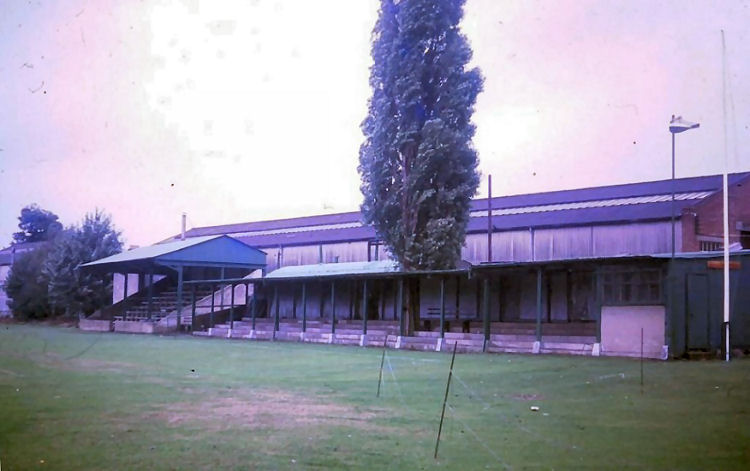
Above photo showing the Brent's Corner stadium circa 1955. Kindly sent
by Rory Kehoe. |
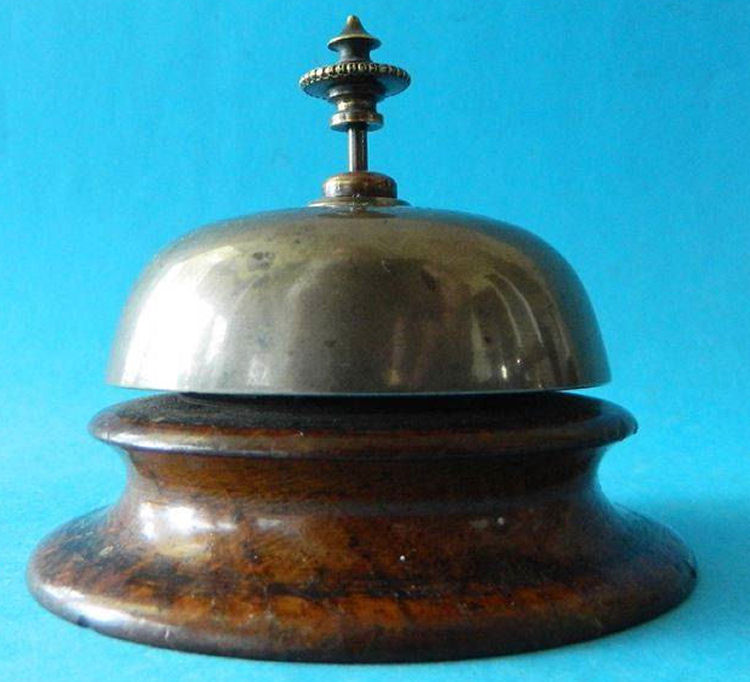
An amazing find! The original counter bell- no doubt
rung to rouse the Innkeeper from his back rooms to come and give good
cheer and service! The Bell is of the twist variety whereby the finial
at top is dialled to make a ratcheted clanger inside ring the bell. The
mechanism is working well. Set upon an Oak or walnut? Wooden base this
handsome old counter bell is beautifully engraved:-
W STOKES HOP POLES INN THANINGTON.
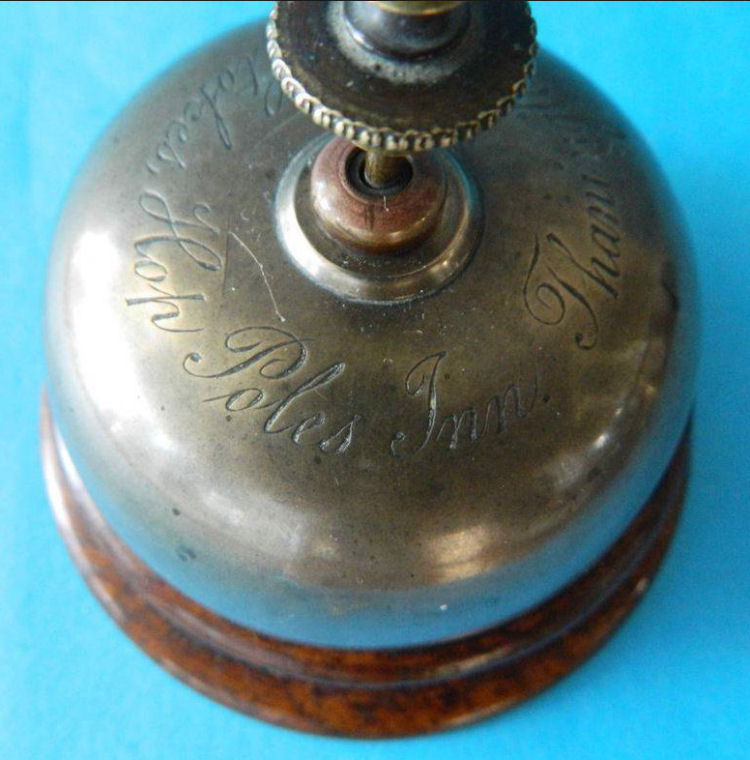
A little history on the Pub below (and Note W Stokes appears in the list
of Publicans and was licensee in 1882-
I should mention whilst presenting very nicely the bell has a soldered
repair from inside to a slit along the metal - as shown in the close up pics. This doesn't seem to affect the function or resonance of the bell!
Base diameter is 95mm 3 3/4 inches. Weight is 200 grams.
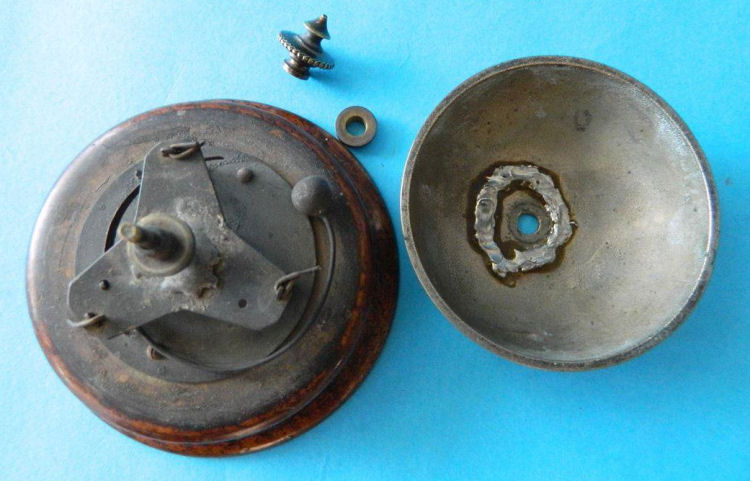
|
LICENSEE LIST
HODGES James 1832-40+
 
GANN Daniel 1845-58+
(age 46 in 1851 ) )
  
ROALFE John 1861-17/Oct/1868 dec'd (age 57 in 1861 ) )

ROLFE Mary Ann (widow) 1870-1/Jan/72 dec'd
WIFFEN Edward 1874+

STOKES William 1881-82+
(age 33 in 1881 ) )

WRAIGHT Mrs Jane 1888-91+ (widow age 48 in 1891 ) )

HORTON A 1903+
 
PAY Alfred 1911+ (age 46 in 1911 ) )
STEWART W J 1913+

DOVE Charles Albert 1919-22+

DOWLE Henry 1930+

STINTON Albert Victor 1938+

UPTON Mr Percy Alfred till late 1941
HART Fred 1950+
LYONS Reg pre 1970s
SEWELL George & Min 1970s
https://pubwiki.co.uk/HopPole.shtml
http://www.closedpubs.co.uk/hoppoles.html
 From the Pigot's Directory 1832-33-34 From the Pigot's Directory 1832-33-34
 From the Pigot's Directory 1840 From the Pigot's Directory 1840
 From Bagshaw Directory 1847 From Bagshaw Directory 1847
 From Melville's Directory 1858 From Melville's Directory 1858
 From the Post Office Directory 1862 From the Post Office Directory 1862
 From the Post Office Directory 1874 From the Post Office Directory 1874
 From the Post Office Directory 1882 From the Post Office Directory 1882
 From the Post Office Directory 1891 From the Post Office Directory 1891
 From the Post Office Directory 1903 From the Post Office Directory 1903
 From the Kelly's Directory 1903 From the Kelly's Directory 1903
 From the Post Office Directory 1913 From the Post Office Directory 1913
 From the Post Office Directory 1922 From the Post Office Directory 1922
 From the Post Office Directory 1930 From the Post Office Directory 1930
 From the Post Office Directory 1938 From the Post Office Directory 1938
 Inns of Canterbury
by Edward Wilmot, 1988 Inns of Canterbury
by Edward Wilmot, 1988
 Census Census
|





















